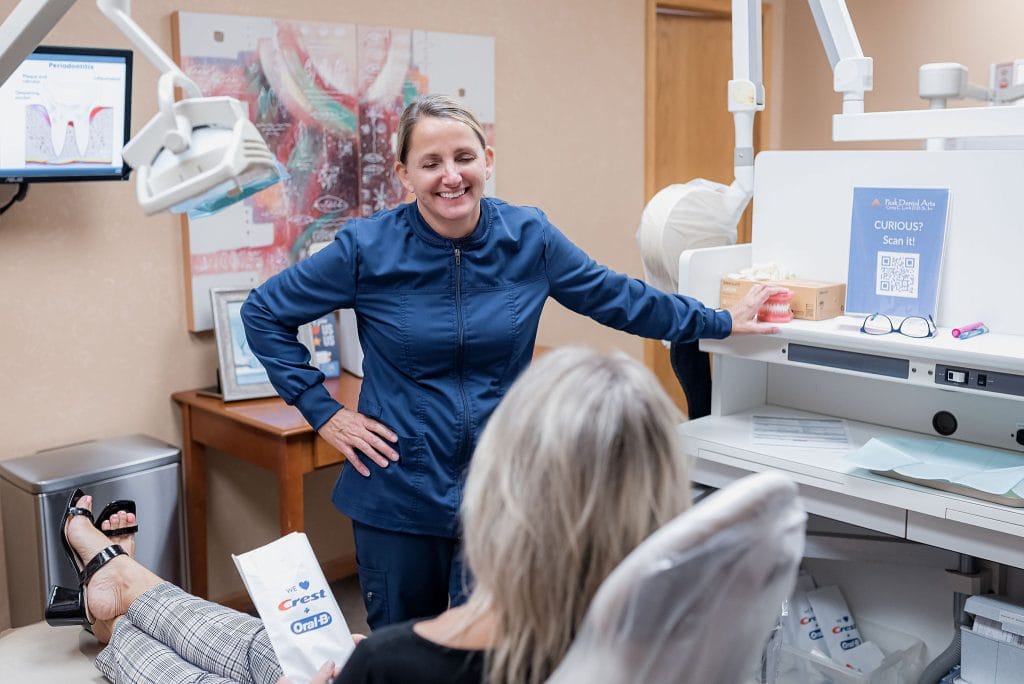The question, “How often should teeth be cleaned?” echoes in dental clinics, discussion boards, and between curious friends. There’s plenty of advice floating around, but what does the expert consensus suggest? More importantly, how should unique circumstances influence the dental hygiene routine of an individual? This post intends to satisfy curiosity and provide clear answers.
So, brace yourself to dive deep into the world of oral health, and emerge with a knowledge that will leave you smiling brighter.
The Importance of Regular Professional Teeth Cleaning

Every journey towards a healthy, dazzling smile begins with understanding the critical role that regular dental cleanings play. It’s not just about aesthetics; it’s about the overall well-being of your mouth and, by extension, your body.
Here’s a look at why these cleanings are crucial and how they influence your general health:
A Guardian of Your Dental Health
Dental cleanings are a proactive measure to keep your oral health in check. Here’s why they’re so vital:
- Prevention of Gum Disease: Regular dental cleanings help reduce the risk of gum disease by removing plaque and tartar buildup. These cleanings can keep periodontal disease at bay, ensuring that your gums stay as healthy as your teeth.
- Detection of Oral Health Issues: A routine dental cleaning is more than just a ‘clean-up.’ It’s an opportunity for your dentist to detect early signs of issues such as cavities, tooth decay, and even oral cancer. Early detection can make all the difference in successful treatment.
- Maintaining a Bright Smile: Regular cleanings help remove surface stains from your teeth, resulting in a brighter, whiter smile. Who doesn’t want their smile to be their best accessory?
Dental Cleanings and Overall Health: An Unexpected Connection
But dental cleanings don’t just stop at giving you a healthy mouth. Their impact extends far beyond, playing a significant role in your overall health:
- Heart Health: Believe it or not, there’s a direct connection between your mouth and heart health. Regular dental cleanings may lower your risk of heart disease and stroke. The reason? Gum disease, if left unchecked, can lead to bacteria entering your bloodstream and causing inflammation, a known factor for heart disease.
- Disease Detection: Regular dental check-ups and cleanings can also result in the early detection of health issues like diabetes –– certain oral symptoms serve as early indicators for these systemic diseases.
- Healthier Pregnancies: Poor oral health has been linked with premature birth and low birth weight. Regular cleanings can contribute to healthier pregnancies.
The Ideal Frequency of Dental Cleanings

Knowing the importance of dental cleanings is one thing, but understanding how often they should be scheduled is another critical piece of the puzzle.
So, what do the experts say? And what factors should be considered when deciding on the frequency?
Expert Recommendations: How Often Should Teeth Be Cleaned?
The general guideline that many dentists recommend is to get your teeth professionally cleaned every six months, according to the American Dental Association. This biannual cleaning schedule is a standard benchmark for maintaining optimal oral health.
However, remember that individual circumstances and needs may influence this timeline.
Factors Influencing the Frequency of Dental Cleanings
- Oral Hygiene Habits: If you’re diligent about brushing twice a day, flossing daily, and using mouthwash regularly, you can stick to the six-month cleaning schedule. But if these habits slip, more frequent cleanings may be needed.
- Diet and Lifestyle: Consuming a lot of sugary foods and drinks can lead to plaque buildup, possibly requiring more regular cleanings. Similarly, smokers are often advised to have more frequent cleanings due to the increased risk of oral health issues.
- Pre-existing Conditions: Certain conditions, such as diabetes or heart disease, require frequent dental cleanings. If you have such a condition, it’s crucial to discuss this with your dentist.
Individual Differences in Oral Health
- Personal Oral Health Habits: Depending on the consistency and thoroughness of brushing and flossing, some may need more frequent cleanings than others.
- Specific Health Conditions: Conditions such as gum disease, dry mouth, or a history of cavities can affect dental cleaning frequency. Individuals with these conditions might require more regular cleanings and check-ups.
- Lifestyle Choices: Habits like smoking or consuming a diet high in sugar and acid can affect oral health, leading to a potential need for more regular cleanings.
Age and Dental Cleaning Frequency
- Children: For most children, the recommended frequency is twice a year. However, in the case of high decay risk or orthodontic appliances, more frequent cleanings may be needed.
- Adults and Seniors: While the biannual rule generally applies to adults, seniors might require more frequent visits due to specific issues like gum disease or dry mouth associated with certain medications.
The Dental Cleaning Process: What to Expect

Understanding what happens during a dental cleaning can make the experience less daunting and more empowering. Here’s an overview of the steps involved in professional dental cleaning and some tips on preparing for your appointment.
Overview of the Dental Cleaning Process
Every dental cleaning follows a general pattern, although the specifics may vary based on your individual needs and your dentist’s practices. Here’s a rundown of what typically happens at your dentist’s office:
- Review of Dental History: Regular teeth cleanings start with a review of your dental and medical history. This helps your dentist or dental hygienist understand any concerns or conditions that might affect the cleaning.
- Oral Examination: Before the actual cleaning process, the dentist or hygienist will visually examine your mouth, teeth, and gums to check for any signs of oral health issues.
- Removal of Plaque and Tartar: Using a dental instrument called a scaler, your hygienist will remove plaque and tartar buildup from your teeth. This process can vary in duration based on the amount of buildup.
- Teeth Polishing: After the plaque and tartar are removed, the hygienist will polish your teeth using a high-powered electric brush and gritty toothpaste.
- Flossing: Your hygienist will floss your teeth to remove any excess plaque or toothpaste.
- Fluoride Treatment: Finally, you may receive a fluoride treatment to strengthen your teeth until your next visit.
How to Prepare for a Dental Cleaning Appointment
To make the most of your dental cleaning appointment, consider the following tips:
- Maintain Your Oral Hygiene Routine: Regular brushing and flossing before your appointment can make your cleaning appointment smoother and more effective.
- Be Ready to Share Your Medical History: If there have been any changes in your health status or medications, be prepared to update your dentist.
- Don’t Eat Right Before Your Appointment: While there’s no need to fast before a dental cleaning, it might be more comfortable to avoid eating immediately before your visit.
- Address Anxiety: If you feel anxious about dental visits, consider discussing this with your dentist. They can suggest strategies or treatments to make you more comfortable.
Smile Brighter with Peak Dental Arts Today
With all this newfound knowledge, it’s time to turn knowledge into action. Peak Dental Arts, the best dentist in Uniontown, Ohio, is your trusted partner, committed to offering superior dental care and guidance. Schedule your appointment with us today and venture into a realm of healthier teeth and brighter smiles. After all, your smile is your most mesmerizing attribute.

